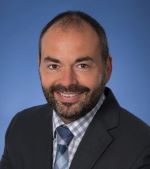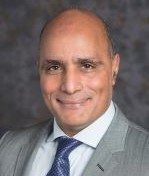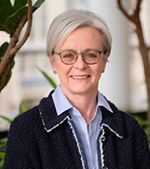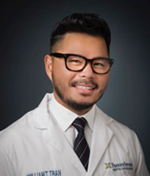Panel: Mr. Paul Cornacchione, Ms. Deborah Russell, Dr. Narinder Paul, Dr. Paula Rowland, Dr. Heidi Schmidt, Dr. William Tran
Moderator: Dr. Ann Russell
Background
This panel discussion will explore the Future of Work in the imaging professions from leaders in health care, engineering and research. This session promises to be a dynamic exchange of reflections, ideas and predictions of what to expect moving forward. Our panelists will address questions related to how they perceive the professions changing in response to automation and artificial intelligence as well as the skills and competencies required to equip imaging professionals for the future of work. Our panelists live on the front lines as leaders of departments and organizations preparing for the future of work in imaging. What do they see and predict from their perspectives and what do we need to understand more about? Please join us for this dynamic session with this accomplished and inspiring group of panelists!
Panel Biographies
 Mr. Paul Cornacchione, MHSc, RT(NM), CHE, is the Senior Director of Imaging Operations for the Joint Department of Medical Imaging, at the University Health Network and Women’s College Hospital sites. Paul has been in health care for over 20 years in a variety of administrative roles. During this time, he has served on an number of provincial and LHIN committees, providing input into the landscape of imaging as well as local health services programming. Prior to his career in administration, Paul served as a Clinical Instructor and part-time Lecturer for the Molecular Imaging Discipline of the MRS Program at the Michener Institute, and currently sits as an Academic Coordinator for the Nuclear Medicine stream of the University of Toronto Medical Radiation Sciences program.
Mr. Paul Cornacchione, MHSc, RT(NM), CHE, is the Senior Director of Imaging Operations for the Joint Department of Medical Imaging, at the University Health Network and Women’s College Hospital sites. Paul has been in health care for over 20 years in a variety of administrative roles. During this time, he has served on an number of provincial and LHIN committees, providing input into the landscape of imaging as well as local health services programming. Prior to his career in administration, Paul served as a Clinical Instructor and part-time Lecturer for the Molecular Imaging Discipline of the MRS Program at the Michener Institute, and currently sits as an Academic Coordinator for the Nuclear Medicine stream of the University of Toronto Medical Radiation Sciences program.
 Ms. Deborah Russell, HR Executive, BA (Hon) in Economics from Queen’s University, a Masters in Industrial Relations from the University of Toronto and a Diploma in Health Administration from U of T, and earned her CHE and CHRP professional designations. Deborah Russell was most recently the Director of Human Resources at the Michener Institute of Education at UHN and Director of the Toronto Rehab Institute for over ten years. Deborah was HR Director at Princess Margaret Hospital and Foundation, UHN Research and Cancer Care Ontario. She also previously worked at Sunnybrook Health Sciences Centre (SHSC) in Human Resources and Hospital Administration.
Ms. Deborah Russell, HR Executive, BA (Hon) in Economics from Queen’s University, a Masters in Industrial Relations from the University of Toronto and a Diploma in Health Administration from U of T, and earned her CHE and CHRP professional designations. Deborah Russell was most recently the Director of Human Resources at the Michener Institute of Education at UHN and Director of the Toronto Rehab Institute for over ten years. Deborah was HR Director at Princess Margaret Hospital and Foundation, UHN Research and Cancer Care Ontario. She also previously worked at Sunnybrook Health Sciences Centre (SHSC) in Human Resources and Hospital Administration.
 Dr. Narinder S Paul, MD, MRCP (UK), FRCR (UK), FRCPC, FSCCTChair / Chief – Department of Medical Imaging, Professor – Department of Medical Imaging, Schulich School of Medicine & Dentistry at The University of Western Ontario. Dr. Narinder Paul is a Professor of Cardiothoracic Radiology, the Chair – Chief of the Department of Medical Imaging at the Schulich School of Medicine & Dentistry at Western University, and a Clinician Scientist at the Robarts Research Institute and the Lawson Research Institute. Previously, he was the Division Head of Cardiothoracic Imaging and the Site Chief for the Joint Department of Medical Imaging at Toronto General Hospital, and Division Chief for Cardiothoracic Imaging at the University of Toronto. Dr. Paul has key research interests in Image Optimization, Radiation Dose Reduction and Perfusion CT. He also has a keen interest in teaching and education.
Dr. Narinder S Paul, MD, MRCP (UK), FRCR (UK), FRCPC, FSCCTChair / Chief – Department of Medical Imaging, Professor – Department of Medical Imaging, Schulich School of Medicine & Dentistry at The University of Western Ontario. Dr. Narinder Paul is a Professor of Cardiothoracic Radiology, the Chair – Chief of the Department of Medical Imaging at the Schulich School of Medicine & Dentistry at Western University, and a Clinician Scientist at the Robarts Research Institute and the Lawson Research Institute. Previously, he was the Division Head of Cardiothoracic Imaging and the Site Chief for the Joint Department of Medical Imaging at Toronto General Hospital, and Division Chief for Cardiothoracic Imaging at the University of Toronto. Dr. Paul has key research interests in Image Optimization, Radiation Dose Reduction and Perfusion CT. He also has a keen interest in teaching and education.

Dr. Paula Rowland, PhD, Scientist Wilson Centre and MD Education, Assistant Professor Department of Occupational Science and Occupational Therapy, Strategic Advisor Centre for Interprofessional Education all at the University of Toronto. Following a clinical career as an Occupational Therapist, Dr. Rowland completed a PhD in organizational studies in 2013. She is particularly interested in the ways the places where professionals work influence what professionals can know, what they can do, how they can learn, and what they can teach. Dr Rowland directs her attention to the ways these workplaces are changing, using theories and tools from the social sciences to better understand the potential implications of these changes for professional work, identity, and education. Ultimately, her program of research contributes to models of education that support future experts and future expertise in a rapidly changing world.
 Dr. Heidi Schmidt, Department Head, Medical Imaging and Program Medical Director of the Joint Department of Medical Imaging at the University Health Network, Sinai Health and Women’s College Hospital in Toronto, and she is a Professor of Radiology at the University of Toronto
Dr. Heidi Schmidt, Department Head, Medical Imaging and Program Medical Director of the Joint Department of Medical Imaging at the University Health Network, Sinai Health and Women’s College Hospital in Toronto, and she is a Professor of Radiology at the University of Toronto
Dr. Heidi Schmidt is the Department Head, Medical Imaging and Program Medical Director of the Joint Department of Medical Imaging at the University Health Network, Sinai Health and Women’s College Hospital in Toronto, and she is a Professor of Radiology at the University of Toronto.
She trained in Germany, where she graduated from Medical School in 1988, and finished her residency as a diagnostic radiologist in 1993. Following a research fellowship at the University of California, San Francisco (UCSF) in 1994, Dr. Schmidt was on faculty of the Department of Radiology at UCSF until she moved to Toronto in 2002. Since then, Dr. Schmidt is a staff radiologist in the Cardiothoracic Division in the JDMI.
After her recruitment to Toronto in 2002, her research focused on lung cancer screening using low-dose computed tomography, both as a site in the International Early Lung Cancer Action Program (I-ELCAP), as well as a site in the Pan-Canadian Early Lung Cancer Detection Study. Since 2017, Dr. Schmidt is the Radiology Quality Lead of the High Risk Lung Cancer Screening Pilot at Cancer Care Ontario.
For more than 10 years, from 2007-2018, Dr. Schmidt was the JDMI Site Director at Women’s College Hospital. For 6 years, she was also the head of the chest section in JDMI, before she became head of the cardiothoracic division in March 2016. In February 2018, she was appointed as interim radiologist-in-chief.
 Dr. William Tran, Assistant Professor, Department of Radiation Oncology, Associate Member, Institute of Medical Science (IMS), University of Toronto, Senior Research Fellow, Sheffield Hallam University (Sheffield, United Kingdom) . The focus of Dr. Tran’s research is to identify predictive (i.e. pre-treatment) and early-response biomarkers for tumour response to chemotherapy and radiotherapy. Specifically, Dr. Tran is interested in exploring quantitative imaging biomarkers from computed tomography imaging, digital pathology, and optical imaging alongside specimen-based markers to design computer-aided theragnostic (CAT) systems. The primary endpoint of Dr. Tran’s research will be improved patient outcomes by using biomarker measurements for adaptive and response-guided cancer treatments.
Dr. William Tran, Assistant Professor, Department of Radiation Oncology, Associate Member, Institute of Medical Science (IMS), University of Toronto, Senior Research Fellow, Sheffield Hallam University (Sheffield, United Kingdom) . The focus of Dr. Tran’s research is to identify predictive (i.e. pre-treatment) and early-response biomarkers for tumour response to chemotherapy and radiotherapy. Specifically, Dr. Tran is interested in exploring quantitative imaging biomarkers from computed tomography imaging, digital pathology, and optical imaging alongside specimen-based markers to design computer-aided theragnostic (CAT) systems. The primary endpoint of Dr. Tran’s research will be improved patient outcomes by using biomarker measurements for adaptive and response-guided cancer treatments.
Within this framework, Dr. Tran’s research is also focused on understanding treatment and survival outcomes associated with biological variances in early-stage invasive breast cancer. As part of a team of physician investigators and scientists, he is working alongside clinical experts to map the genetic and biological characteristics associated with chemotherapy resistance and radiation refractory breast cancer.
Moderator Biography:
 Dr. Ann Russell, PhD Applied Research Director, The Institute for Education Research, Senior Director of Learning, Innovation and Applied Educational Research at the Michener Institute for Education at UHN. Dr. Ann Russell is a cognitive scientist who completed her PhD at the Ontario Institute for Studies in Education at the University of Toronto. Her clinical background is in the area of neuropsychology and cognitive-behavioural therapy working across the spectrum of health care from primary care to rehabilitation and complex continuing care. While her clinical experience is in the area of individual assessment and treatment of cognition and emotion, her design research focuses on distributed cognition, especially design, implementation and evaluation of interprofessional networks of practice and expertise. Dr. Russell is the Senior Director of Learning, Innovation and Applied Educational Research at the Michener Institute for Education at UHN. Dr. Russell is responsible for advancing the Institute’s simulation, innovation and research strategies and priorities which are guided by the following questions: “What will health professionals be doing in 2040 and beyond? How are we responding to and anticipating change in the professions through innovative programming and partnerships?”.
Dr. Ann Russell, PhD Applied Research Director, The Institute for Education Research, Senior Director of Learning, Innovation and Applied Educational Research at the Michener Institute for Education at UHN. Dr. Ann Russell is a cognitive scientist who completed her PhD at the Ontario Institute for Studies in Education at the University of Toronto. Her clinical background is in the area of neuropsychology and cognitive-behavioural therapy working across the spectrum of health care from primary care to rehabilitation and complex continuing care. While her clinical experience is in the area of individual assessment and treatment of cognition and emotion, her design research focuses on distributed cognition, especially design, implementation and evaluation of interprofessional networks of practice and expertise. Dr. Russell is the Senior Director of Learning, Innovation and Applied Educational Research at the Michener Institute for Education at UHN. Dr. Russell is responsible for advancing the Institute’s simulation, innovation and research strategies and priorities which are guided by the following questions: “What will health professionals be doing in 2040 and beyond? How are we responding to and anticipating change in the professions through innovative programming and partnerships?”.